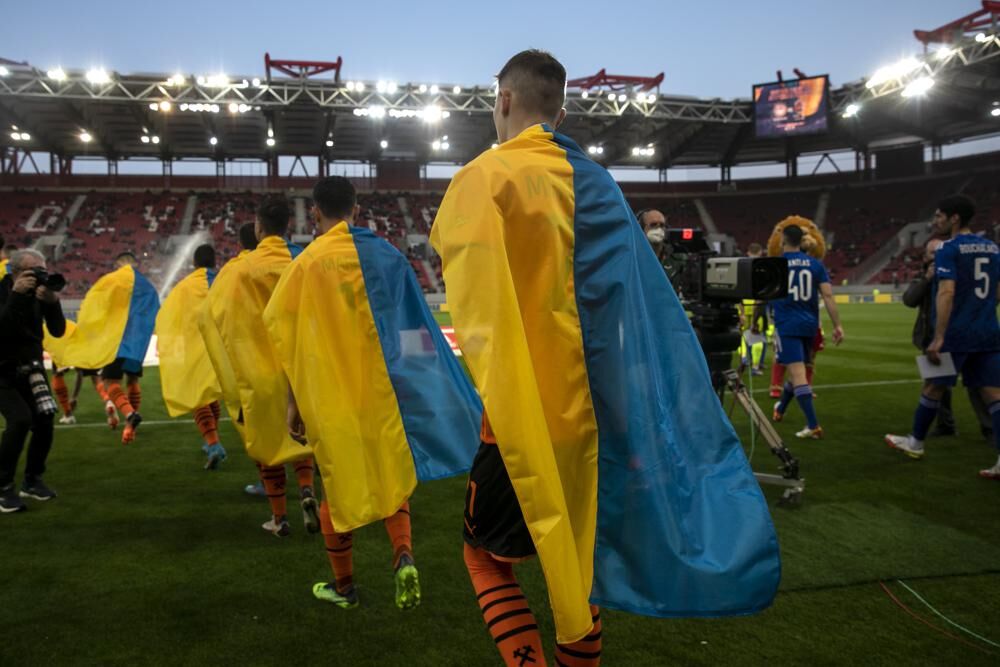Ukraine soccer club Shakhtar survives into 9th year of exile
Published 4:00 pm Saturday, June 11, 2022

- Players of Shakhtar Donetsk enter the pitch ahead of a friendly charity soccer match against Olympiakos at Karaiskaki stadium in Piraeus, near Athens, on Saturday, April 9, 2022. Ukraine’s top soccer team plans to host its Champions League games in Poland and make a humanitarian tour of the United States. They feel like natural next steps for Shakhtar Donetsk after eight years exiled from its home city by Russian aggression. Shakhtar has played only away games since conflict in its Donbas region started in 2014.
GENEVA (AP) — Hosting Champions League games in Poland and planning a humanitarian tour of the United States feel like natural next steps for Ukraine’s top soccer team after eight years exiled from its home city by Russian aggression.
The story of Shakhtar Donetsk — playing only away games since conflict in its Donbas region started in 2014 and the full invasion by Russia shut down Ukrainian soccer this year — might be unique in world soccer.
Shakhtar’s sporting director Darijo Srna told The Associated Press his club was “the only one in the history of football” to have endured such tests.
Unable to use its stellar $400 million stadium since 2014, forced to live and play in adopted home cities across Ukraine, Shakhtar has now had no competitive games since December because of the Russian invasion.
Still, Srna is working around uncertainty over the club’s roster to plan for a new season in the Champions League and renewal of the Ukrainian Premier League.
“They attack our country, our land,” said Srna, a former Shakhtar captain whose shirt number 33 was retired by the club. “But in the end we are still here, we are still alive.”
The domestic league that was abandoned last season — Russia invaded one day before the end of its mid-winter break — is set to start again in August.
The Champions League kickoff is Sept. 6, after a UEFA ban on Russian teams removed Zenit St. Petersburg and helped lift Shakhtar directly into the 32-team elite. Russian clubs have appealed against the UEFA ruling.
“We will play in Champions League group, they will play nothing,” Srna said, referring to Russian clubs. “They can watch on television.”
Being seen worldwide is a “small but important victory for Ukrainian and European football,” he said of a team that hosted Real Madrid, Inter Milan and Sheriff Tiraspol in Kyiv last season..
However, taking international games to Ukraine is now an unacceptable security risk so Shakhtar is talking with Legia Warsaw about staging its three Champions League home games.
“The minimum what we can give to Poland is Champions League football,” Srna said. “They opened the door of the country for Ukrainian people, they opened their hearts.”
The team will look like Shakhtar in distinctive orange and black uniform, but with more players unfamiliar to viewers used to a core of Brazilian stars like Fernandinho, Willian and Douglas Costa over the past two decades.
“We do not know yet with which kind of team because, more or less, we sell or give a loan to all foreign players,” Srna said from London, lamenting that “agents want to take our players for free. They don’t respect the situation today.”
The future for Shakhtar is “more or less a Ukrainian team with the young, hungry players.”
Despite more than 100 appearances for Croatia, Srna talks about Donetsk in Ukraine’s industrial heartland as a home after 15 years and more than 500 games as a player through 2018. He won 10 league titles and lifted The Miners’ only European trophy, the 2009 UEFA Cup.
Srna’s loyalty is tied to a special relationship with Shakhtar’s billionaire president Rinat Akhmetov. He also owns the Azovstal steelworks in Mariupol that is symbolic of Ukrainian defiance and Russian bombardment.
Akhmetov’s money built the Donbass Arena stadium that was key to Ukraine co-hosting the 2012 European Championship. It has been neglected but not destroyed, Srna said, during the Russian occupation.
“He is the key of this success of Shakhtar,” Srna said of Akhmetov. “He is the guy, the person, who never gives up. In difficult moments you must help other people.”
Akhmetov this week pledged $2 million to help Ukrainian soccer restart. A 16-team top tier should include two teams promoted to replace Mariupol and Chornomorets Odesa, Srna said.
The league aims to play all games on Ukraine soil, though Shakhtar will prepare next month at training camps in the Netherlands and Slovenia.
After touring Europe in April to play fund-raising games for the military effort, Shakhtar ran out of time to organize a similar trip to the United States. A tour in December is an option, Srna said.
“The most important (thing) is to play,” he said, “to show the world that we are still alive, that we are fighting, that we are living, that we will have a good future.”




